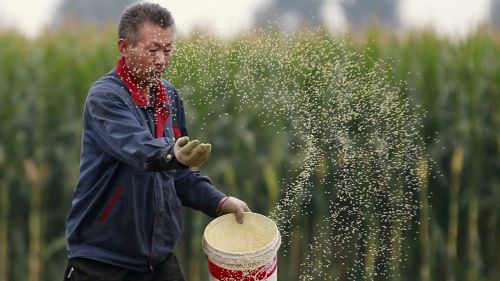In China, Seeds are the New Semiconductors

Chinese officials have elevated food security as a policy priority, and they're taking seeds seriously.
China’s Ministry of Agriculture and Rural Affairs believes the country’s lag in seed breeding technologies and commercialization is the weak link in its ability to balance grain supply and demand for food security. But the government does not want to rely on foreign technologies to close the gap. It will make a push to accelerate biological breeding, gene editing, and synthetic biology by Chinese firms through R&D, acquisition, and possibly intellectual property (IP) theft, to produce Chinese seeds for Chinese soil. Domestic seeds account for 95 percent of all seeds planted in the country today—the government wants to keep it that way.
Seeds are the New Semiconductors
As the foundation of China’s advanced technology industries, the Chinese government sets industrial targets and directs state funds toward self-sufficiency in semiconductors. Chinese officials, having elevated food security as a policy priority, are calling seeds the new semiconductors.
Growing rapidly over the last two decades, China’s investment in agriculture now exceeds public expenditure in the United States. The country’s public and academic institutions are filing increasing numbers of applications for agricultural patents and new IP rights for plant varieties.
China’s private sector, however, has been a relatively insignificant player in commercializing seed innovations. Whereas private companies in the US drive three-quarters of the research that leads to commercial applications, companies in China are responsible for only 10 to 20 percent of R&D.
This is partly because the industry is fragmented, comprised of some 6,400 registered seed production companies that are mostly small. Similar to Beijing’s approach in other industrial sectors, the Ministry of Agriculture and Rural Affairs has been instructed to push private sector consolidation by directing government support to leading enterprises that can best accelerate the country’s commercial seed industry. In other words, it should pick winners among China’s largest seed firms.
Accelerate through Acquisition
Acquisition has been pursued in recent years as the quickest way for China to gain access to seed technologies discovered elsewhere, though many such large deals have not panned out as expected.
The largest and most high-profile acquisition was ChemChina’s purchase of Swiss agribusiness Syngenta, one of four companies that dominate the global market for seeds and crop chemicals. However, like many of China’s state-owned enterprises, ChemChina operates at a loss. With ChemChina at the helm, spending on R&D declined significantly and the company could not grow in the Chinese market due to China’s regulatory barriers on sales of genetically modified seeds. On top of this, the company claims the majority of its global intellectual property is still owned by Swiss affiliates of Syngenta. Industry analysts now foresee that ChemChina will put Syngenta back on the international market.
Yet another high-profile deal was the purchase of Dow Chemical’s corn seed business in Brazil for US$1.1 billion by CITIC Agri Fund, which is associated with seed firm Yuan Longping High-Tech Co Ltd. According to Dow public statements at the time, the deal included seed research centers and access to Dow AgroSciences’ Brazilian corn germplasm bank.
State-owned seed companies also continue to shop for assets that become available through international mergers, such as Bayer’s takeover of Monsanto and the merger of Dow with DuPont. But given the seed industry’s importance to national security, these mergers and acquisitions have been heavily scrutinized by government regulators in the host countries. They are increasingly screened through the lens of foreign investment reviews specifically to prevent the transfer of key technologies and IP.
Steal It, If Necessary
Several high-profile prosecutions in the US of theft or “economic espionage” by Chinese nationals of seed technologies have raised awareness that intelligence collection in the agricultural industry is taking place on a much larger scale than previously realized.
According to FBI Director Christopher Wray, “[The Chinese Communist Party is] targeting research on everything from military equipment to wind turbines to rice and corn seeds.” American agriculture, he cautioned, is one of the softest targets for IP theft, whether through access to privileged company research, the transfer of information out of university or government research facilities, or by simply digging up seeds in a field.
The Chinese government can also access proprietary data through regulatory submissions by foreign companies. As part of the Phase One deal, China agreed to prohibit unauthorized disclosure of undisclosed information, trade secrets, or confidential business information when submitted to central or subcentral levels of government, but the proof will be enforcement of these commitments.
Homegrown GM Seeds?
The main policy approach in China’s new national food security strategy is to accelerate major seed innovation projects and implement stronger domestic IP rights for the “industrial application of biological breeding.”
Researchers in China’s public and private organizations will be incentivized to accelerate development of grain varieties and hybrid seeds using the most advanced gene editing tools. There is even speculation that Beijing is preparing to greenlight approvals of more genetically modified (GM) seeds, which many Chinese farmers have been clamoring for and possibly buying already on the black market.
China allows imports of around 50 types of GM crops, including soybeans. The commercial planting of GM crops in the country, however, remains almost entirely illegal, except for some strains of cotton, papaya, tomato, and tobacco. In 2020 and 2021, the Ministry of Agriculture issued five biosafety certificates to domestically developed GMO crops. None have yet to receive approval to plant.
Herein lies the catch-22 for the Chinese government. It will have to decide whether to allow the domestic sale of more GM seed varieties, especially for grains. Without the ability to sell GM seeds, the country’s firms have little incentive to develop them. And if it approves domestic GM seeds, what will its rationale be for failing to approve foreign GM seeds for use by Chinese farmers?

